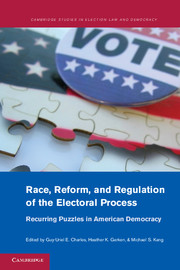Book contents
- Frontmatter
- Contents
- Figures
- Tables
- Contributors
- Preface
- Introduction: The Future of Elections Scholarship
- PART I RACE AND POLITICS
- PART II COURTS AND THE REGULATION OF THE ELECTORAL PROCESS
- Overview: Mapping Election Law's Interior
- 4 The Institutional Turn in Election Law Scholarship
- 5 Judges as Political Regulators
- 6 Empirical Legitimacy and Election Law
- 7 Judging Democracy's Boundaries
- PART III ELECTION PERFORMANCE AND REFORM
- PART IV CONCLUSION
- Index
- References
4 - The Institutional Turn in Election Law Scholarship
Published online by Cambridge University Press: 01 June 2011
- Frontmatter
- Contents
- Figures
- Tables
- Contributors
- Preface
- Introduction: The Future of Elections Scholarship
- PART I RACE AND POLITICS
- PART II COURTS AND THE REGULATION OF THE ELECTORAL PROCESS
- Overview: Mapping Election Law's Interior
- 4 The Institutional Turn in Election Law Scholarship
- 5 Judges as Political Regulators
- 6 Empirical Legitimacy and Election Law
- 7 Judging Democracy's Boundaries
- PART III ELECTION PERFORMANCE AND REFORM
- PART IV CONCLUSION
- Index
- References
Summary
One of the central problems for election reform – and a central concern of elections scholarship – is political self-interest. Political lock-ups and lock-outs (Issacharoff and Pildes 1998; Cain 1999) – efforts by incumbents to entrench themselves – lead to a set of electoral rules and institutions that range from the silly to the perverse. The result is not only bad policy, but a system that is unusually resistant to change.
Political self-interest is, however, a double-edged sword (Kang 2006; Gerken 2007). Scholars familiar with its perverse consequences in the elections arena tend to lament its existence, but political self-interest is also the engine that fuels a vibrant political system. The key in the arena of election reform is to figure out how to align the interests of partisans with the interest of voters, to redirect political energies into healthier channels. The key is to harness politics to fix politics.
Stated in these terms, the idea seems unobjectionable, even banal. Of course, one thinks, we should be attentive to partisan self-interest in thinking about reform. But even though most agree with the basic idea, scholars have not been sufficiently attentive to all of its implications. This is an idea worked out in the “apps,” an idea whose significance becomes apparent only when one digs into the questions of institutional design and election reform that are the bread-and-butter of election law scholarship. We believe that the field should shift its emphasis in several ways.
- Type
- Chapter
- Information
- Race, Reform, and Regulation of the Electoral ProcessRecurring Puzzles in American Democracy, pp. 86 - 100Publisher: Cambridge University PressPrint publication year: 2011
References
- 2
- Cited by



